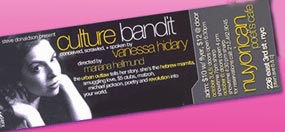
|

|
Jewish World Review May 13, 2003/ 11 Iyar, 5763
http://www.jewishworldreview.com |
Do not tell Vanessa Hidary that she doesn't look Jewish. A guy she met at a bar once made that mistake, and she burned him bad — on national TV, no less, in front of millions of people.
But at least the reprimand rhymed:
But as Hidary tells me over coffee at the Upper West Side Starbucks where she writes most of her rhymes, she wasn't always so outspoken about her identity. Now 32 (funny, she doesn't look 32), with brown shoulder-length curls and pretty dark eyes that she inherited from her Syrian-Jewish mother, she does seem like she could pass for membership in any number of ethnic groups. And she did.
Growing up a few blocks away, she says, she was latently ashamed of her Jewishness and preferred to absorb the styles of her black and Latino friends. Sticking up for herself as a Jew wasn't even a thought. As she notes in her poem, the backhanded compliment from that barfly actually came years ago. At the time, she had no response.
"I just thought being Jewish wasn't cool," she explains.
But Hidary began to discover her voice while at graduate acting school in Rhode Island. She started writing her own monologues because she couldn't find any audition material that fit her. It was there, too, away from the Upper West Side, that she realized being Jewish was different, and special. Years later, some song lyrics she wrote for a vocalist friend would turn into her first self-examining spoken-word piece: I'm the Culture Bandit / I eat matzoh in Harlem / I was thrown out of Hebrew school / 'Cause I spent Rosh Hashanah at the Puerto Rican Day Parade!
When she performed it at her first poetry slam, she says, the response of the decidedly non-Jewish audience was overwhelming. "I was so surprised — it was just my life and I didn't think it was that interesting," she says. "But I guess it's my point of view that intrigues people. There is a voice missing in the urban setting — the non-apologetic Jewish voice."
That poem grew into "Culture Bandit," her signature show, an autobiographical hour which she is performing all this month at the celebrated Nuyorican Poets Café on the Lower East Side. It's the story of a chameleon who once hid her true colors, clinging to other cultures until she was eventually drawn to her own. Told through story-poems and music samples, it's a funny, poignant, and sometimes dark look at New York race relations, as well as a journey back to the 1980s heyday of early hip-hop, when groups like Run DMC and De La Soul attracted young people of all ethnic backgrounds. Just this year, "Culture Bandit" was optioned for a screenplay.
Largely perceived as the domain of African-Americans, hip-hop has seen its appeal explode and its cultural influence widen way beyond its rap roots. Besides hip-hop poetry, there is now hip-hop journalism, hip-hop fiction, and even a Hip-Hop Theatre Festival that tours the country each year (Hidary will take part in Washington, D.C., in July), where people of all races can be found on the stages or in the seats.
Still, any white performers to come on the scene have had to confront cynics who think they are trying to be something they're not. The secret of Hidary's success is that she so obviously knows who she is. There are other Jews on the spoken-word circuit, but whereas many tend to get political (i.e. Israel), Hidary sees her piece as personal, cultural, and constant, never tied to current events. "No matter what's going on in the world," she says, "I'm not going to conveniently decide when it's cool to be Jewish."
Outside New York, she has performed in Los Angeles and on a number of nearby college campuses, but the HBO show was her first exposure to the rest of America. Since it aired, she's received hundreds of e-mails from Jewish fans across the country who appreciate her bold message.
As for the would-be-suitor subject of her Def diatribe, she doesn't really care if he gets the message now. It's no longer just for him.
"I've found a way to use my art to do what I've always wanted to do — to get people to think and feel and examine their own prejudices and barriers," she says. "Am I expecting to change the world? No. But I want to raise issues that I think people can relate to, whether they're Jewish or not."
Enjoy this writer's work? Why not sign-up for the daily JWR update. It's free. Just click here.
 Hip-Hop Mameleh
Hip-Hop Mameleh
By Victor J. Wishna
What does Jewish look like to you?
When Hidary made her fiery debut last month on HBO's Def Poetry series, a national audience got its first glimpse of the "Hebrew Mamita," a fixture on the New York spoken-word scene for more than two years. With impressive showings at poetry slams around the city and a one-hour, one-woman show entitled "Culture Bandit," Hidary has found success in a venue where few like her have made their mark ("Def Becomes Her — Jewish Girl Goes Hip-Hop" whooped the New York Post). Sharing stages with modern-day beat poets with names like Lemon and Black Ice, she introduces mixed crowds to one example of what Jewish looks like: A sexy, Oy-Veying, chutzpah-having / Non-cheaping, non-conspiracizing, always questioning / Hip-hop-listening, Torah-scroll-reading, all-people-loving / Pride-filled Jewish Girl!
Should I fiddle on a freakin' roof for you?
Should I humor you with "Oy veys!" and refuse to pay?
'Cause you know how we like to Jew you down…
Jew you down? I'd like to throw you down!
JWR contributor Victor J. Wishna is a New York City-based journalist. Comment by clicking here.
